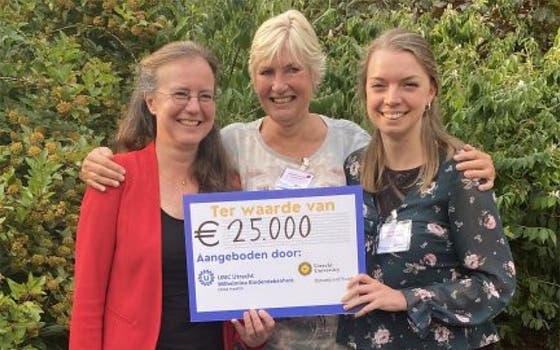Research grant for musical stimulation in young at-risk children

Does a musical game help map stimulus processing in young at-risk children? Can a questionnaire help to understand the development of these children? These are the questions researchers from UMC Utrecht and UU will be addressing in the near future. They received a so-called Booster grant of €25,000 last summer. This year, they started their research on musical stimulation in young at-risk children.
With the Booster grant, UMC Utrecht - Child Health and UU - Dynamics of Youth encourage researchers from different scientific backgrounds to work together. The aim is to make a valuable contribution to youth research. The winners included Corline Parmentier, physician-researcher (UMC Utrecht); Anja Volk, professor of music information computing (UU); and Anneloes van Baar, professor of diagnostics and treatment at Pedagogical Sciences and GZ-psychologist (UU).
More research is necessary
Parmentier has long been conducting research on young at-risk children born with oxygen deprivation around birth (perinatal asphyxia). She works closely with paediatrician Thomas Alderliesten, who works at the UMC Utrecht neonatal neurology expertise centre of the Wilhelmina Children's Hospital. The children are at risk of brain damage which can lead to movement problems or lower IQ. Therefore, children with severe oxygen deprivation around birth up to an age of 8-10 years are revisited at the outpatient clinic to monitor their development. Here, we noticed that later in life, these children often show problems with attention, memory loss and have concentration and behavioural problems. This invited additional research. "It frustrates me quite a bit that we know very little about the long-term consequences of severe oxygen deprivation around birth and that parents face surprises as a result," says Parmentier. The speed dating rounds during the Booster Drinks proved to be a godsend.
Collaboration
During the speed dating rounds, Parmentier made valuable connections with fellow researchers. This is how Parmentier came into contact with now her colleagues Van Baar and Volk. Van Baar focuses on premature infants.
She previously created an online questionnaire system for parents to form a picture of their child's development. Parmentier and van Baar want to find out if they can also apply this questionnaire to children born with oxygen deprivation. By doing so, they hope to find out more about how the child is developing, without requiring an extra visit to the outpatient clinic. The second aim of the study focuses on the role of music in the development of young at-risk children. Within this group, problems are regularly seen in children who have trouble processing information, what they see, hear or smell. Anja Volk previously developed a musical game in collaboration with the UMC Utrecht (the group Development in Perspective) to measure this so-called stimulus processing of children, in which children have to mimic rhythms. With this rhythmic game, Parmentier, Van Baar and Volk want to investigate whether children born with an oxygen deficiency have difficulties with stimulus processing. They focus on children who have shown developmental delays based on the questionnaire.
Parmentier, Van Baar and Volk have now started research on using the online questionnaire system for parents with children with asphyxia to understand how these children develop. They are also working hard to adapt the musical game so that they can deploy and evaluate it among young children in the future. By the end of this year, Parmentier and colleagues expect the first results.
Photo. From left to right: Anja Volk, Anneloes van Baar, Corline Parmentier
